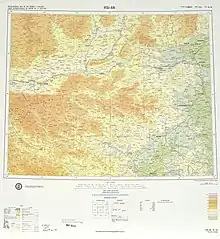Lo-yang
English

Map including LO-YANG (DMA, 1975)
Etymology
From Mandarin 洛陽/洛阳 (Luòyáng) Wade–Giles romanization: Lo⁴-yang².[1]
Proper noun
Lo-yang
- Alternative form of Luoyang
- 1922, Shigeyoshi Obata, transl., Li Po, the Chinese Poet, page 180:
- These passages refer, of course, to the rebellion of An Lu-shan. General Ku Shu defended the Han-ku Pass, which is an older name for Tun Kuan. By the twin imperial cities the poet very probably means Hsing-yang and Chang-an, unless he means the latter and city of Lo-yang.
- 1957, Bo Gyllensvärd, T'ANG GOLD AND SILVER (Museum of Far Eastern Antiquities Bulletin), volume 29, Göteborg: Elanders Boktryckeri, pages 26-27:
- On the whole we can state that if there is any local information about the finds of gold and silver vessels from T'ang, then Ch'ang-an — present Hsi-an — or Lo-yang with their neighbourhood is referred to.
- 1998, Peers, Chris, Warlords of China 700 BC to AD 1662, Arms and Armour Press, →ISBN, →OCLC, page 19:
- Eventually, the ramshackle Chou government fell apart. In 771 BC the barbarian Jung tribes sacked the Chou capital at Hao, and forced the court to flee eastwards down the Yellow River to Lo-yang. Most of the king's vassals failed to support him in this crisis. This is the context for the famous story about the foolish emperor who called out his nobles with their troops for a joke, to amuse his concubine, so that when a real invasion occurred they no longer took any notice. Whatever the truth of this, the Chou ruler could no longer rely on his over-mighty subjects.
- For more quotations using this term, see Citations:Lo-yang.
-
Translations
Luoyang — see Luoyang
References
- “Selected Glossary”, in The Cambridge Encyclopedia of China, Cambridge University Press, 1982, →ISBN, →LCCN, →OCLC, pages 476, 482: “The glossary includes a selection of names and terms from the text in the Wade-Giles transliteration, followed by Pinyin, […] Lo-yang (Luoyang) 洛陽”
This article is issued from Wiktionary. The text is licensed under Creative Commons - Attribution - Sharealike. Additional terms may apply for the media files.